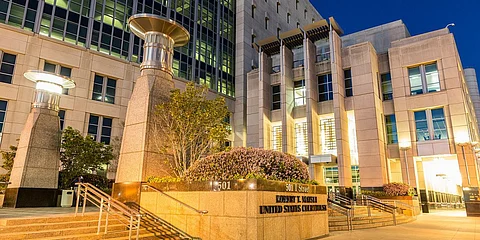

Follow TNM's WhatsApp channel for news updates and story links.
In a powerful affirmation of caste-oppressed communities’ civil rights, the United States District Court for the Eastern District of California dismissed a lawsuit filed by the Hindu American Foundation (HAF) that claimed California’s anti-caste efforts violated the religious freedoms of Hindu Americans.
The court’s judgement on July 18, was issued in the case filed by the Hindu American Foundation, an American Hindu non-profit advocacy group run by privileged caste Hindu Americans. HAF had challenged the California Civil Rights Department’s authority to investigate and prosecute caste discrimination, arguing that it falsely equated caste with Hinduism and infringed upon the constitutional rights of all Hindu Americans.
The Director of the California Civil Rights Department (CRD), in the judgement, found that HAF lacked standing and failed to state any viable legal claims. The court firmly rejected HAF’s argument that caste protections infringe on religious rights, calling its claims “entirely unpersuasive.”
In a statement released on July 22, the Savera coalition, a network of US-based anti-caste organisations including the Ambedkar King Study Circle (AKSC), said the ruling marked a “historic win” for civil rights in the US. “This decision sends a strong message: caste-based exclusion and abuse have no place in our institutions,” the press release said.
The court’s ruling delivers a decisive blow to attempts by Hindu nationalist advocacy groups in the US to argue that caste protections amount to religious persecution. Judge Dale A Drozd noted the inconsistency in HAF’s stance — claiming caste is not central to Hinduism, while also arguing that protections against caste discrimination violate Hindu religious freedom.
Four key outcomes
The court’s 31-page judgement outlined four major outcomes:
> Affirmation of state authority: The CRD has the constitutional right to enforce anti-discrimination laws, including against caste-based discrimination.
> Legitimacy of CRD actions: The lawsuit against Cisco Systems, a major California tech firm, was found to be a legitimate public enforcement action, not a private legal dispute.
> Rejection of religious freedom argument: The court ruled that the CRD’s enforcement did not violate any First Amendment rights of Hindu Americans, dismissing the argument as “entirely unpersuasive.”
> No standing for HAF: The court held that HAF does not represent all Hindu Americans and failed to show concrete links to the broader community. “Plaintiffs have shown no facts demonstrating actual activities, engagement, or funding mechanisms,” the judge wrote.
The case originated from CRD’s 2020 lawsuit against Cisco for allegedly enabling caste-based discrimination against a Dalit engineer by higher-caste Indian-American managers. HAF had earlier tried to intervene in the Cisco case but was denied by California state courts.
The federal court’s July 18 ruling dismissed HAF’s second amended complaint that was filed in September 2024, without leave to amend, stating that any further amendment “would be futile in this case.”
South Asian response and significance
The ruling was widely welcomed by Dalit and anti-caste organisations in the US. Karthikeyan Shanmugam, convenor of AKSC, called it “a historic win.” In the Savera press release, he said: “This affirms that caste discrimination is a civil rights violation and cannot be shielded by claims of religious freedom.”
Roja Singh, president of Dalit Solidarity Forum, stated that the decision confronts decades of caste oppression in the US and ensures caste-oppressed people “can live and work with safety, dignity, and equality.”
Vivek Kembaiyan of Hindus for Human Rights remarked, “Hindu far-right groups have weaponised the language of civil rights and religious freedom. But they continue to fail miserably in the courts.”
Jawad Ahmed of the Indian American Muslim Council also applauded the ruling: “This judgement affirms that no group should weaponise its identity to uphold systemic oppression.”
The Savera coalition called the decision “a beacon of hope,” saying that caste discrimination has no place in societies that value equality and justice.